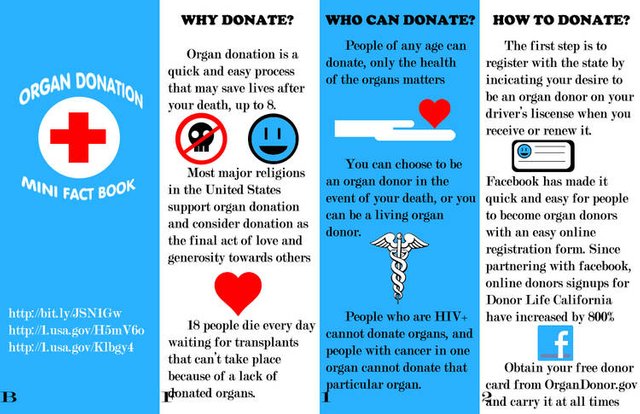Greetings friends of Steemit and Healthy Steem
Organ donation in India.
Indian citizens can pledge to donate their organs, so that if you die, your body can be useful to multiple people. It's probably a little unpleasant to think about your death, but if you actually think about it, organ donation is a sort of extension of your life, isn't it?
But first, let's understand what organ donation is and how it works in India. I'll also tell you how easy it is to register as a donor. You can then make an informed decision for yourself.
Organ Transplantation and Donation are permitted by law under the Transplantation of Human Organs Act, 1994. This Act allows organ donation by live and brain-stem-dead donors. A 2011 amendment made way for the donation of human tissues. This amended Act is called the Transplantation of Human Organs & Tissues Act, 2011.
According to this Act, buying or selling organs in any way is a punishable offence.
An organ is a part of the body that performs a specific function, and includes the heart, lungs, kidney and liver.
But it is not only after death that a person can donate an organ.
The first is living donor organ donation, where a person can donate certain organs while still alive.
These include one kidney, since the other kidney is capable of maintaining body functions for the donor, a portion of the pancreas, as half is enough for sustaining pancreatic functions; and a part of the liver as segments of the liver will regenerate in time in both the recipient and donor.
The second type of organ donation is when the donor is deceased.
A person can donate multiple organs and tissues after brain-stem or cardiac death, and the donated organs continue to live in another person's body.
A question that some may have is whether there is an age limit for organ donation.
This varies depending on whether it is a living or cadaver donation. In a living donation, the donor should be above 18. For most organs, the deciding factor is the donor's physical condition, not age. Specialist healthcare professionals decide which organs are suitable on a case-by- case basis. In case of tissues and eyes, age doesn't usually matter.
Deceased donors can generally donate organ and tissues with the following age limits:
Kidney, Liver: up to 70 years; Heart, Lungs: up to 50 years; Pancreas, Intestine: up to 60-65 years; Skin: up to 100 years; Heart Valves: up to 50 years; and Bone: up to 70 years. Organs and tissue from donors in their 70s and 80s have been transplanted successfully globally.
So, apart from just age, who can actually be a donor?
A living donor has to be 18 or older, and should have voluntarily authorised the removal of any organ and/or tissue, during their lifetime.
As for deceased donors, people of any age, race or gender can become an organ and tissue donor after death.
The consent of a near relative or person in lawful possession of the dead body is required before such donation. If the deceased donor is under 18, consent from a parent or authorised near relative is required.
The medical suitability for organ donation is determined at the time of the donor's death.
Before I conclude I would like to invite three fellow Steemians to participate in the contest
@crismenia
@eveetim
@georgitsachev
Thank you for reading my post.


X Link
https://x.com/Saha_tweet/status/1841704345206759750
Downvoting a post can decrease pending rewards and make it less visible. Common reasons:
Submit